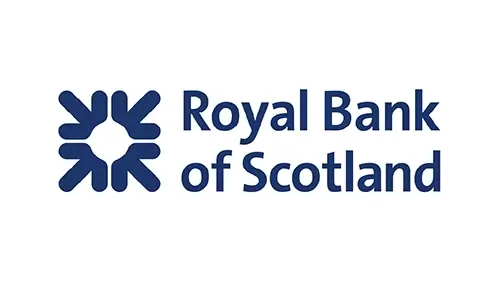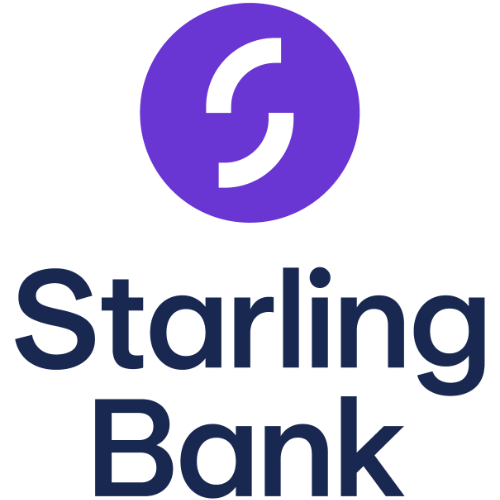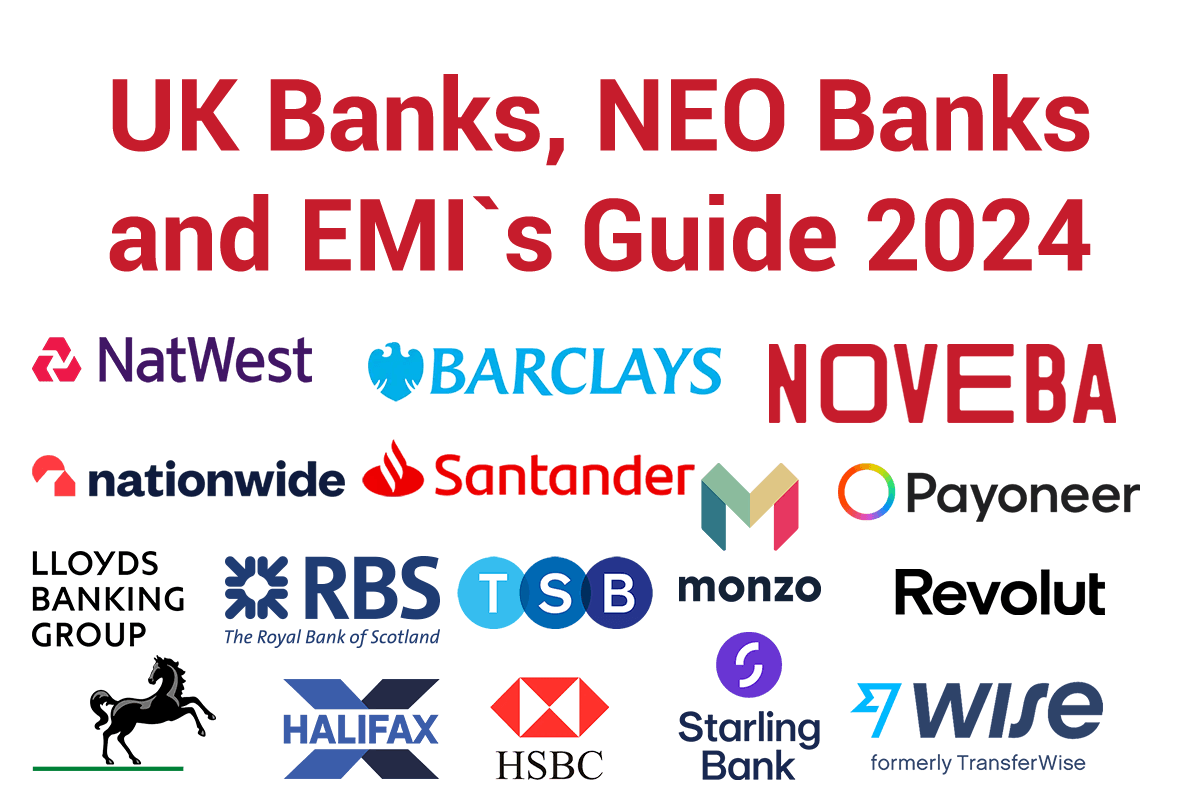What kind of banks there are?
There are two types of banks: physical banks and mobile banks. Physical banks have buildings you can visit if you have any questions, while mobile banks are on your mobile, like an app such as PayPal. Mobile banks are becoming very popular in the UK. We will review the Mobile/Neo banks available in the UK. But first, let’s look into the physical banks.
To open an account in a physical bank, you need your passport, your BRP card, and a letter from the university if you are studying there, stating that you are a student. If you are coming as a family, you need your passport, BRP (Biometric Residence Permit), and a utility bill or your accommodation contract. Let’s look into the physical banks:

Royal Bank of Scotland (RBS)
RBS acquired NatWest a few years back. They offer an everyday bank account with no monthly fees and up to a £500 overdraft limit. The rates for international payments are similar to NatWest.

NatWest
You can open an everyday current account, which is free with no monthly charges. You may be eligible for up to a £500 overdraft limit, subject to eligibility. For international payments, receiving payment from abroad into your NatWest account costs £7, and sending money outside the EU costs £15 for immediate service, free for normal service (2-4 days).

HSBC
They offer an International Student Bank Account or a Standard Current Account. Both accounts are free to use with no monthly charges. The International Student Bank Account does not offer an overdraft facility. Receiving money from abroad costs £5 per transaction, and sending money abroad also costs £5 per transaction. Cashback is available on selected retailers through HSBC’s Home&Away offers programme.

Barclays
You can open a sole or joint account. It’s free, and you are eligible for up to a £1000 overdraft. Receiving money from abroad costs £6 per transaction. Sending money abroad is free through Barclays banking.

Nationwide
They offer the Flex account, which is free to use. Sending money abroad costs £20, and receiving money from abroad is free.

Santander
They offer a basic current account that is free to use. Receiving money from abroad is free, but sending money abroad costs £25.

Halifax
They offer a basic current account that is free to use. Receiving money from abroad costs £7 per transaction, and sending money abroad costs £20 per transaction. You can get up to 15% cashback when using their Visa debit card at selected retailers.

Lloyds
They offer a Classic Current Account that is free to use with no monthly charges. Receiving money from abroad is free if it comes from within the EEA in euros; otherwise, it costs £2 to receive up to £100 and £7 for amounts over £100. Sending money abroad costs £9.50 per transaction for payments in any currency other than euros, with additional correspondent bank fees ranging between £12 and £20 depending on the destination. You can get up to 15% cashback when using their Visa debit card at selected retailers through the Everyday Offers program

TSB Bank
They offer a Spend and Save current account that is free to use with no monthly fees. Receiving money from abroad costs £7 per transaction, and sending money abroad costs £20 per transaction. You can earn 2.89% Gross / 2.92% AER Variable on savings placed in Savings Pots within the account.
These are the major physical banks in the UK. There are other banks like Tesco, Sainsbury’s, and Metro Bank, but these are the major ones.
Now, let’s look into mobile banks.
Mobile banks are banks on your mobile. You can download their apps, log in, and create an account within minutes. You will receive your debit card within one or two days. They are very flexible, easy to use, and easy to manage. Many people, including students and working professionals, are switching to mobile banks. I’ll talk about two of the major mobile banks in the UK: Monzo and Starling.

Monzo
You can open a current account, which is free to use. To deposit money, you need to go to a PayPoint shop and deposit up to £300 at a time, costing £1 per deposit. Monzo uses Wise (formerly TransferWise) for international payments, which can be reliable but may incur fees depending on the destination and amount. Your money is protected up to £85,000 by the Financial Services Compensation Scheme (FSCS)

Starling Bank
They offer a current account that is free to use with no monthly fees. Receiving money in a Starling account is free. Your money is protected up to £85,000 by the Financial Services Compensation Scheme (FSCS). Starling does not charge for non-UK pound transactions, unlike other cards that charge around 2.75%. Their apps are flexible and easy to use, allowing you to manage your spending and open savings pots with an interest rate of up to 3.25% AER on balances up to £5,000
All above are fully licensed banks in the UK
Which means they must comply with stringent regulatory requirements set by the Financial Conduct Authority (FCA) and the Prudential Regulation Authority (PRA). These regulations include verifying the identity and residency of their customers to prevent fraud, money laundering, and to ensure they are servicing the UK market.
You may now ask, what accounts can I open from outside the UK – without residency or UK proof of address?
The answer is EMIs (Electronic Money Institutions), they have a flexibility to offer services to a global audience without such residency requirements, but can still provide UK bank details.

Noveba
Noveba offers multi-currency accounts with SEPA and SWIFT transfers, dedicated IBANs, and MasterCard debit cards. Fees for personal accounts include a £0 initial fee, no monthly fee`s, SEPA out 0.10%, SEPA in free, and various card fees. Funds are safeguarded but not FSCS protected. Available globally without UK residency proof.

Wise
Wise provides multi-currency accounts specializing in low-fee international transfers. Funds are safeguarded in segregated accounts, but not FSCS protected. Available globally without UK residency proof.

Payoneer
Payoneer offers multi-currency accounts, global receiving accounts, and payment solutions. Various fees apply for receiving payments, currency conversion, and ATM withdrawals. Funds are safeguarded but not FSCS protected. Available globally without UK residency proof.

Revolut
Revolut provides multi-currency accounts with features like budgeting tools and cryptocurrency trading. Fees range from free to €45/month depending on the plan. Funds are safeguarded and protected under the Lithuanian Deposit Insurance System. Available globally without UK residency proof.
Normally, opening a UK bank account requires being physically present in the UK and providing proof of address, which can take up to a month to obtain after securing housing. This delay is due to the time required for utility bills or other official documents to arrive.
However, Electronic Money Institutions (EMIs) offer a convenient alternative. EMIs, such as Wise, Payoneer, Revolut, and Noveba, allow you to open multi-currency accounts from your home country, without needing UK residency. This flexibility makes EMIs a perfect solution for managing finances before and after moving to the UK.
So what is the Difference Between EMIs and Traditional Banks?
Electronic Money Institutions (EMIs) offer multi-currency accounts with easy international transfers, do not require local residency, and provide UK bank details. EMIs safeguard customer funds in segregated accounts and are regulated for protection, allowing them to be used like traditional banks for receiving salaries and everyday spending. However, they lack deposit insurance like the FSCS. Traditional banks offer comprehensive services including loans and overdrafts, provide deposit insurance, but require proof of residency and more extensive documentation.
Disclaimer
The information in this article is for general informational purposes only and is not intended as financial or professional advice. We strive for accuracy, but make no warranties regarding the completeness or reliability of the information. Banking services and regulations may change, so verify details with financial institutions.
We are not liable for any loss or damage from using this information. Consult a financial advisor before making banking decisions.

